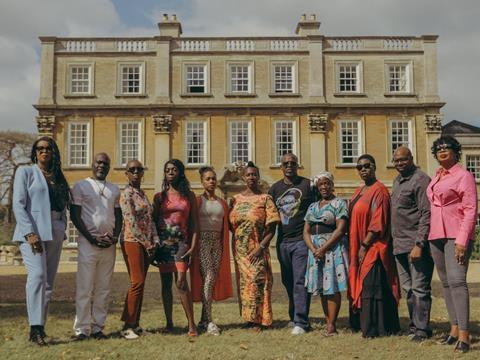Like the children in White Nanny, Black Child. Antony Aris-Osula was a Black Nigerian placed into white foster care. He reflects on his own spiritual journey and how he found his identity in Christ

“Mummy, why are you white, and I’m brown?” asked a young black boy, around three or four years old. An elder white woman gently replied: “Because I asked God for a brown baby son. You are special, Tony.”
That little boy was me and, although I had no idea at the time, my situation was far from unique. God had seemingly answered this prayer many times – about 70,000, to be precise.
Fast forward to October 2023 and another family conversation unfolded. “Kids, White Nanny, Black Child is on!” exclaimed the anxious black man from his living room sofa, sat next to his wife. The teenagers reluctantly shuffle in, perhaps bewildered by the unusual tension in the room. Yes, the man on the sofa is also me. This is my family, gathered to watch a TV documentary on Channel 5.
Farmed out
I thought White Nanny, Black Child was wonderful, but that’s probably because I’ve waited decades to see this story shared in the mainstream, hoping that people, both white and black, would finally ‘get it’ and possibly ‘get’ me, too.
I wasn’t in the documentary, but could see myself in each of the nine participants bonded by this ‘farming’ experience.
The search for identity is fundamentally a quest to understand what it means to be human
‘Farming’ refers to the process of black children from Nigeria being placed in white UK foster homes. This happened through informal private agreements from the late 1950s to the early 2000s.
Many ‘farmed’ children grew up feeling isolated, despite their foster families’ love.
Gloria, who is one of the voices featured in the documentary, contacted me after reading my book, Coconut Prince: Memoir of a black sheep (Rite Tone). Surprised, I chuckled, as even some of my friends and family hadn’t read it. As warm as she appears on the screen, Gloria introduced me to a community of black formerly trans-racially fostered children. It was like a secret society without the strange rituals, unveiling a lifetime of trauma, identity crises and misunderstandings.
Finding my roots
As I watched each story unfold, I was reminded of my own spiritual and identity journeys.
Like Gloria and Richi, who was left outside the Nigerian embassy by his birth family, as an adult I pondered: “Who am I?” Yes I’m spiritually grounded, having found my identity in Christ, but what about my roots in the natural world?
Much of Western Christianity has been negatively influenced by gnostic thinking, particularly the tendency to separate the spiritual from the material. The original Hebrew mindset is different, viewing material and spiritual as connected and equally important to God and humanity. Where I come from matters. So began my search for my biological family.
The dark side
Some aspects of humanity are disturbing, like the sinister side of transracial fostering that subjected children to abuse. Yewande’s experience was particularly heart-wrenching. She endured constant racial, physical and sexual abuse while moving between foster care and children’s homes. This ordeal not only robbed her of her identity but also her childhood innocence, leaving an enduring impact.
I used to see my own experience as a triumph of love transcending racial boundaries, but I had never considered the dark side of the farming experience. Whether in a loving or abusive white home, the net result often amounted to alienation and identity loss. I wondered if Moses felt conflicted being raised in a loving Egyptian home while also belonging to a marginalised, immigrant people?
I once encouraged a fellow ‘farmed’ individual by drawing a parallel to the biblical character Joseph, separated from family in a foreign land, suggesting that her pain and insight could help others like his did. Sometimes God uses adversity to cultivate something powerful, challenging norms and touching the human spirit. Perhaps the search for identity, whether black, white, or something else, is fundamentally a quest to understand what it means to be human and experience love.
In the story of the Good Samaritan, the twist is that a Samaritan, typically seen as an enemy to the Jewish people, shows love to a Jew. Perhaps, in our identity-obsessed culture, the twist we need is to recognise that love isn’t confined to those who resemble us or share our DNA. Perhaps those who have suffered a loss of identity can guide us all towards rediscovering our shared humanity, regardless of race or culture differences. Fish and chips or okra soup with pounded yam, we all get to eat at God’s table, special in our own story. We all have the right to be seen and heard. It’s that black and white.
White Nanny, Black Child is available now at channel5.com



































No comments yet